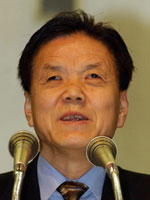Success Stories: Persons with Disabilities
Dr. Young-Woo Kang (2003)

Blinded in a playground accident as a teenager in his home country of Korea, hardship and pain became Young-Woo Kang’s closest companions at an early age. Young-Woo learned soon after that his mother had died while walking home from his hospital bedside and in desperation tried to commit suicide.
Orphaned and blind in a society that treated blind people as outcasts, relegating them to lives as masseurs, Young Woo refused to accept a downtrodden role. Instead of allowing the tragic events of his young life to destroy him, he drove himself to pursue a college education while others told him it couldn’t be done. Young-Woo became the first blind person to be admitted to the prestigious Yonsei University in Seoul. After he graduated with honors, he went on to become a Rotary Foundation Scholar at the University of Pittsburgh in Pennsylvania, and he became the first blind Korean to earn both a masters degree (Psychology) and a doctorate (Special Education).
Dr. Kang is a member of the National Council on Disability (NCD), an independent federal agency which makes recommendations to the President and Congress on issues affecting 54 million Americans with disabilities. Dr. Kang was the Dean of South Korea’s Taegu University, Supervisor of Special Education in Indiana, and is currently an adjunct professor at Northeastern Illinois University in Chicago. He has written many books including “Two candles shining brightly in the darkness of the world,” which has been translated into six languages and made into a talking story book for the U.S. Library of Congress. In addition, an award winning full-length film entitled A light in my heart, was produced depicting his life of intense struggle and victory for the inspiration of all.
Dr. Kang received the Asian American Society Outstanding Contribution and Achievement Award in 2001. His determination to succeed ultimately forged his character and helped bring about significant improvements in the lives of people with disabilities in Korea and throughout the world.

